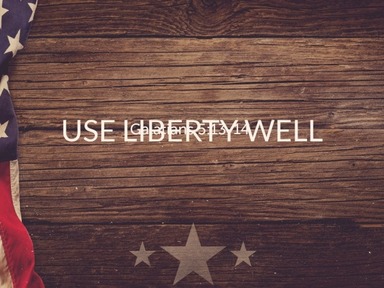Use Liberty Well

Notes
Transcript
Introduction
America is a nation of laws but it was intended to be a nation of law. That may seem like a subtle difference but it is actually quite significant.
John Adams famously said, “Our Constitution was made only for a moral and religious people. It is wholly inadequate to the government of any other.”
The constitution was a compact, but short legal code written by men who made two very important assumptions in its design:
Personal accountability to God
Personal responsibility toward others
We can see both of these assumptions being made as early as the Declaration of Independence.
We hold these truths to be self-evident, that all men are created equal, that they are endowed by their Creator with certain unalienable Rights, that among these are Life, Liberty and the pursuit of Happiness.
What happens when those two assumptions are no longer valid? Morality and responsibility have to be legislated. We suddenly need a law to govern every aspect of life because we lack the morality and responsibility to govern ourselves. We become a nation of laws instead of a nation of law.
Many people believe that we are free to do whatever we want, whenever we want, with whomever we want, for as long as we want…as long as it is legal. But that is contrary to the assumptions our country was founded upon.
Transition
Whatever else may be happening around us in our nation and culture, we, as believers have the unique opportunity to live out the freedoms our founding fathers envisioned. We can because we have, or should have, a sense of morality and a sense of responsibility.
This is one of the ideas the Apostle Paul expressed in his letter to the church at Galatia.
Illumination
He said it this way:
13 For you, brethren, have been called to liberty; only do not use liberty as an opportunity for the flesh, but through love serve one another. 14 For all the law is fulfilled in one word, even in this: “You shall love your neighbor as yourself.” 15 But if you bite and devour one another, beware lest you be consumed by one another!
The Call to Liberty, 13a
The Call to Liberty, 13a
We think in terms of freedom from oppression or freedom of expression
Paul thought a little differently
Freedom from slavery. The phraseology is that of manumission from slavery, which among the Greeks was effected by a legal fiction, according to which the manumitted slave was purchased by a god; as the slave could not provide the money, the master paid it into the temple treasury in the presence of the slave, a document being drawn up containing the words “for freedom.” No one could enslave him again, as he was the property of the god.
Free from what slavery? In a word: sin.
John 8:34 Jesus answered them, “Most assuredly, I say to you, whoever commits sin is a slave of sin.
Romans 6:16 Do you not know that to whom you present yourselves slaves to obey, you are that one’s slaves whom you obey, whether of sin leading to death, or of obedience leading to righteousness?
Liberty, as Paul spoke of it, is the basis for our moral accountability to God.
The Use of Liberty, 13b-14
The Use of Liberty, 13b-14
Liberty is not an opportunity to indulge your flesh. What is the flesh?
Doing what you feel like
When you feel like it
Where you feel like it
For as long as you feel like it
With whomever you feel
Liberty is an opportunity to serve your neighbor
Through love (agape) that puts the needs of others ahead of the wants of self
For mutual benefit. If each of us was looking out for the other’s needs than we would have far fewer needs than we do today
Liberty, as Paul spoke of it, is the basis for our personal responsibility.
Putting the needs of others ahead of the wants of self brings up a natural point of fear because it is abusable. This brings up:
The Danger of Liberty, 15
The Danger of Liberty, 15
Abuse leads to loss: “Liberty consumes liberty.”
Takers use up [consume] all of the giving
Takers discourage giving
We understand the frustration of giving to takers
We struggle to be giving people in a taking environment
Conclusion
As believers, we are uniquely situated to lead the way in living free as our founders envisioned.
Imagine what our world could look like if everyone was actually looking out for everyone else. Such a world seems almost too good to be true. And it is, as long as know one is leading the way toward it. We should lead the way:
We have a sense of moral accountability
We have a sense of personal responsibility
We have a sense of true freedom
We have the sense to see the need
Application
What can we actually do? We can do the one thing that fulfills then law, both biblical law and national law, by loving our neighbor as ourself. If we just start there and keep doing it even when people abuse it, we will lead the way to freedom. We will be nicer people. And, we will be happier people.
It is possible to be free! If we use liberty well.